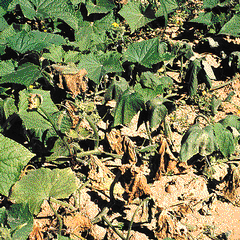The Ortho Home Gardener's Problem Solver
Cucurbits: Bacterial Wilt
 Problem
Problem
A few leaves wilt and dry and may be chewed. Wilted leaves often recover at night, but wilt again on sunny days and finally die. Fruit shrivels. To test for bacteria, cut a wilted stem near the base of the plant and squeeze out the sap, looking for a milky white substance. Touch a knife to the sap and withdraw it slowly. Look for a white ooze that strings out in a fine thread as you withdraw the knife.
Analysis
This plant disease is caused by a bacterium (Erwinia tracheiphila) and is more prevalent on cucumbers and muskmelons than on pumpkins and squash. Watermelons are not affected. The bacteria spend the winter in striped or spotted cucumber beetles, and are spread to plants when the beetles feed. (For more information on cucumber beetles, see Cucumber Beetles.) An entire plant may become infected within 15 days. The disease is most prevalent in cool weather in areas with moderate rainfall.
Solution
There are no chemical controls for bacterial wilt. Remove and discard all infected plants promptly. Control cucumber beetles with an insecticide containing carbaryl or diazinon. Repeat the treatments every 7 days if the plants become reinfected. (For more information about controlling disease-carrying insects, see Vectors of Plant Diseases.) Grow varieties resistant to this disease.
Copyright©1997. Books That Work.
Copyright©1982, 1993, 1997. Monsanto Company.
Visit Books That Work at http://www.btw.com
